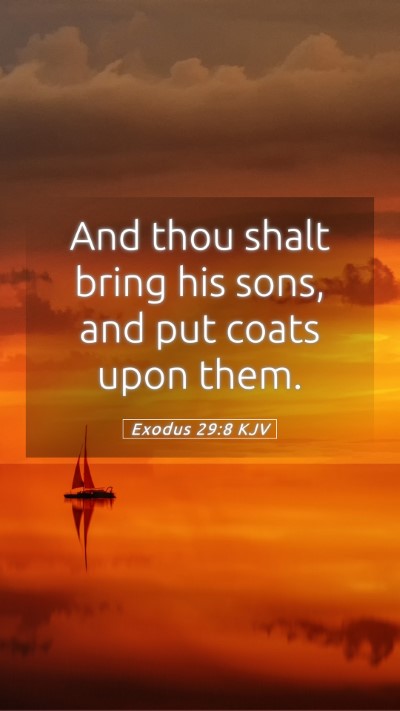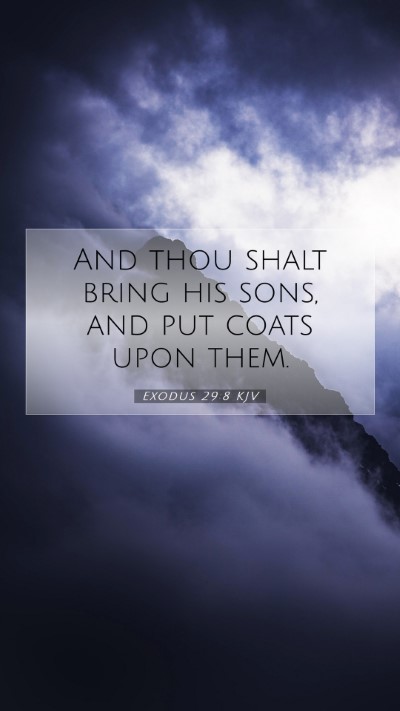Understanding Exodus 29:8
Exodus 29:8 states: "And thou shalt bring his sons, and clothe them with coats:" This verse pertains to the ceremonial ordination of Aaron and his sons as priests in the Ancient Israelite context. Through a careful examination of this passage using biblical commentaries, we gain insights into its significance and meaning in both a historical and spiritual context.
Summary of Meaning
This verse signifies the act of preparing Aaron's sons for their priestly duties by clothing them in specific garments, symbolizing their consecration and separation for service to God. In essence, clothing in biblical traditions often represents identity and purpose, particularly in the context of divine service.
Commentary Insights
- Matthew Henry: Henry emphasizes that the clothing of the priests was part of God’s divine appointment for their roles. It reflects both honor and holiness, suggesting the gravity of their responsibilities before God and the people.
- Albert Barnes: Barnes highlights the ceremonial aspects of the clothing as a means to distinguish the sons of Aaron from the laypeople. This separation underscores their special role in worship and service within the community of Israel.
- Adam Clarke: Clarke points out that the actual garments worn by priests held significant symbolism, representing moral and spiritual integrity. The physical act of dressing in priestly garments is paralleled with the internal sanctification required for service.
Theological Significance
The act of clothing the priestly sons is deeply rooted in the theological understanding of being set apart for God. This reflects a broader biblical theme of calling and consecration, where specific individuals or groups are chosen for a divine purpose.
Biblical Exegesis
Exegesis of Exodus 29:8 allows us to explore:
- The cultural context of priestly duties in Ancient Israel.
- The importance of ritual purity and sanctification in approaching God.
- The typological significance of priesthood as foreshadowing Christ’s ultimate priestly role.
Application to Daily Life
This scripture encourages believers to consider the importance of being set apart for God in their daily lives. Just as the priests were given specific garments to signify their role, modern believers are called to live a life reflective of their identity in Christ, exhibiting the fruits of the Spirit.
Additional Reflections
Building on the understanding of this verse, believers might explore how to embody the principles of service, dedication, and holiness in their own lives, paralleling the responsibilities of the ancient priests.
Cross References
- Leviticus 8:7-9: The ordination and clothing of Aaron and his sons are further detailed, emphasizing the significance of priestly garments.
- 1 Peter 2:9: Believers are described as a royal priesthood, underscoring the call to holiness in their service to God.
- Hebrews 5:4: Discusses the necessity of divine appointment for the role of a priest, reflecting the same principles seen in Exodus.
Study Insights
For those engaging in Bible study groups or online Bible study, this passage invites further examination into the priesthood, sacrificial systems, and the transformative symbolism of clothing throughout Scripture.
Concluding Thoughts
Understanding this verse invites us to reflect on the sacredness of our calling as individuals chosen for God's service. By studying this passage and its broader implications, believers can find guidance in how to approach their spiritual lives with reverence and purpose.


